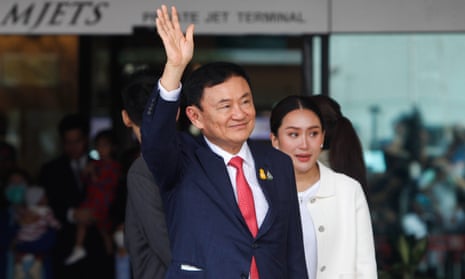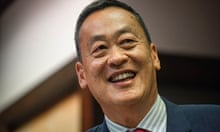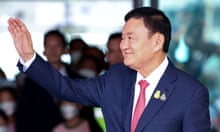Thailand’s parliament has ended three months of political deadlock – hours after the former prime minister Thaksin Shinawatra returned from exile – by approving the property tycoon Srettha Thavisin’s appointment as prime minister.
Srettha will lead a controversial alliance that brings together Pheu Thai, the party backed by Thaksin, and its historic rivals – parties linked to generals who led the last coup in 2014.
Who is Thaksin and what happened today?
Thaksin is a hugely influential and polarising politician who has dominated Thai politics for decades. He became prime minister in 2001 and developed a loyal support base among rural voters in the north and north-east by offering welfare and economic policies to improve people’s livelihoods. But he was also accused of corruption and human rights abuses and was loathed by conservatives in Bangkok, who considered him a threat to the monarchy.
Thaksin was ousted in a coup in 2006 and has lived in self-imposed exile for more than 15 years to avoid legal charges.
On Tuesday, however, he arrived by private jet at a Bangkok airport. Hundreds of supporters turned out to welcome him. He appeared only briefly in front of the media and was driven straight to court – then jail.
What is Thaksin’s relationship with the military-royalist establishment?
For decades, Thaksin has been loathed by the establishment, who viewed him as an unprincipled, corrupt politician and a threat to the monarchy.
However, the two sides are now uniting in an unusual alliance. Verapat Pariyawong, a political analyst, said that while the new alliance may be shocking to the public, to politicians it was “basic realpolitiking”. “It’s time for them to join hands for their own mutual interests,” he said.
The conservative establishment arguably faces a much bigger problem than Thaksin. Instead, it is threatened by the rise of the youthful, reformist Move Forward party, which won the most seats in the general election in May after promising big changes to the power structures in Thailand. Move Forward had pledged to reform the lese-majesty law, remove the military from politics and break up big business. Some of its MPs are activists who were once on the frontlines of monarchy reform protests and who have since been charged with lese-majesty. It was blocked from taking power by military-appointed senators.
Move Forward’s growing popularity also poses a threat to Pheu Thai. In May’s election, the younger party surprised many by outperforming Pheu Thai, and even poaching seats in Thaksin’s stronghold, Chiang Mai.
Thailand may be moving into a new era, away from the divides that have shaped the past two decades, said Verapat, and “towards a new clash between the traditional establishment versus the Move Forward party and their supporters”.
What is the link between Thaksin’s return and the attempts to form a new coalition government?
Analysts have speculated that, given Thaksin is returning to Thailand just as his party takes office, a deal has likely been made to soften his sentence. His daughter Paetongtarn Shinawatra, who also ran as one of Pheu Thai’s prime ministerial candidates, has denied this claim, however, and said that her father is returning because he wants to be with his grandchildren. In the past, he has frequently said he wants to return home.
According to the supreme court, he faces eight years in prison.
What’s the role of Thailand’s unelected senate?
Thai election rules were rewritten after the 2014 coup to tilt the system in favour of candidates linked to the military. In order to become prime minister it is necessary to secure majority support from the lower house of 500 elected MPs and the 250 senators – unelected and appointed by the armed forces.
Even though Move Forward won the most seats and the most votes in May, and formed a coalition that gave it a majority among the lower house of elected MPs, this was not enough to outweigh the influence of the senate.
Pheu Thai’s leaders said they had no choice but to join hands with the military side, given the electoral rules.
What does Pheu Thai’s deal with the military mean for its future?
The deal has angered many Pheu Thai supporters, who say the party has abandoned the democratic values it is supposed to represent. Some point to the more than 90 people killed during a 2010 crackdown by the army on protesters who had taken to the streets in support of Thaksin, and question how the party can countenance such an alliance.
The deal has also infuriated Move Forward supporters, who voted hoping for democratic reforms.
Some Pheu Thai supporters are more sympathetic, saying the party had few options. However, it is widely expected that Pheu Thai’s decision will mean that it loses support to Move Forward, which will now present itself as the only true pro-democracy party.
Who is Srettha Thavisin?
Srettha, a 60-year-old real estate tycoon, was voted in as Thailand’s next prime minister on Tuesday. Pheu Thai has tried to stress his business credentials and present him as someone who can boost the economy. Some analysts have also described him as a compromise candidate who may be acceptable to people on both sides of Thailand’s political divides.
He has never held a ministerial position, however, and will face a difficult task in leading a coalition that brings together unlikely partners.
Srettha was born into a wealthy family in Bangkok and worked for Procter & Gamble in Thailand before founding Sansiri, one of the country’s biggest real estate developers. He is married to an expert in anti-ageing medicine, with whom he has three children.
Srettha became the chief adviser for Pheu Thai earlier this year, but he has long been associated with the Shinawatra family. He opposed the movement that led to the overthrow of the government led by Yingluck, Thaksin’s youngest sister, and later described being one of the first business people to have been summoned by the military junta after the 2014 coup.
Over recent weeks Srettha has faced allegations relating to his business dealings, including a claim that he colluded to help a group of landowners evade a large tax bill. Srettha has denied the suggestions, and is suing the person who made the allegation.
Srettha has said that if he were to take office, he would not seek to abolish or amend the lese-majesty law, under which criticising the monarchy can lead to a sentence of up to 15 years in prison. Instead, he says he will focus on improving the economy and people’s livelihoods.









